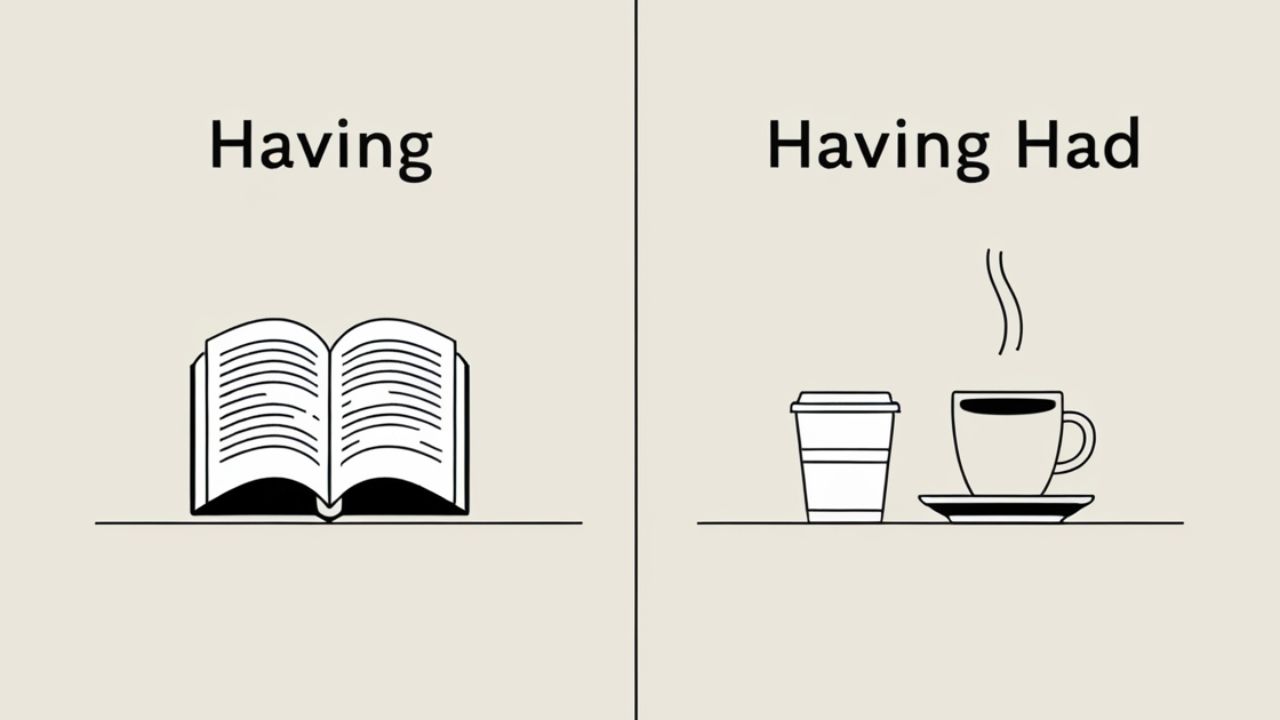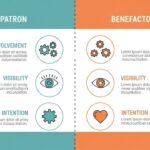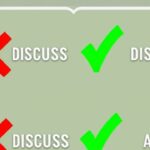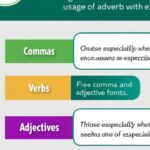Having is a helpful word in English. It can act like a name for an action, such as “Having fun makes us smile.” It can also connect two actions, like “Having eaten, he played.” This form keeps sentences clear and simple.
Having had shows that something finished before another action started. For example, “Having had lunch, she walked outside.” This phrase gives a clear order. It tells the reader one thing ended, and then something new began right after it.
Writers use these forms to make their words strong and clear. Having works well in everyday talk and stories, while having had adds detail in formal writing. Both forms help express time and order without confusion or long sentences.
What Does “Having” Mean in English Grammar?
“Having” acts as both a gerund and a perfect participle.
As a gerund:
- Having changes a verb into a noun-like word.
- It names an action, not just shows it.
- Example: “Having pets is fun.”
- It often talks about habits or feelings.
- It makes sentences short and clear.
As a perfect participle (in perfect constructions):
- Having + past participle shows one action finished before another.
- It links two ideas smoothly in one sentence.
- Example: “Having finished homework, he played.”
- It saves words instead of using long clauses.
- It adds order and clarity to writing.
| Form | Meaning | Example |
| Having + base verb (gerund) | Action as a noun | Having fun keeps me energized. |
| Having + past participle | Completed action before next one | Having eaten, he went for a walk. |
What Does “Having Had” Mean?
- Having had shows that something was fully completed before another action.
- It marks a clear sequence of events in time.
- Example: “Having had dinner, she relaxed.”
- Writers use it for formal or careful expression.
- It gives precision when showing past actions.
| Phrase | Sequence | Example |
| Having eaten | Ongoing/Simultaneous | Having eaten, he reads the newspaper. |
| Having had eaten | Completed before another action | Having had breakfast, she started her day. |
Differentiating “Having” vs. “Having Had”

- Having often shows an action happening now or just finished.
- Having had always shows something finished before another event.
- Example: “Having tea, he smiled” vs. “Having had tea, he left.”
- One is current or near-present, the other points backward.
- Using them correctly makes sentences clear and well-ordered.
When Is “Having Had” Necessary?
- Use it to show one action was fully done before another began.
- It works best in formal writing like reports or studies.
- Example: “Having had training, she performed with skill.”
- It avoids confusion about time order in sentences.
- It adds precision when plain having is not enough.
| Informal phrase | Formal alternative |
| After I ate, I felt full. | Having had a meal, I felt full. |
| After she spoke, she paused. | Having spoken, she paused. |
Common Errors with “Having” and “Having Had”
- Using having had where only having is correct.
- Mixing both forms in the same sentence without need.
- Overusing having had in casual or simple writing.
- Forgetting that having can mean present or recent action.
- Translating directly from another language and misplacing forms.
See also : Is It Correct to Say Well Wishes? Meaning & Usage
Formality & Context: When Each Form Is Preferred
- Having fits well in everyday speech, stories, and casual writing.
- Having had suits formal reports, studies, and structured essays.
- Creative writing often uses having to link smooth actions.
- Business writing may need having had for accuracy.
- The choice depends on tone, audience, and clarity.
| Context | Preferred Form |
| Formal report | Having had a deep conversation, we… |
| Blog post | Having posted, I noticed the comments |
| Short story | Having walked miles, she paused |
| Daily conversation | After I’d eaten, I felt better |
The Grammar Behind It: Perfect Participle Explained
- The perfect participle is made with having + past participle.
- It shows that one action finished before another began.
- Example: “Having studied, she passed the test.”
- It joins ideas without using longer clauses.
- Writers use it for clarity, order, and smooth flow.
Mastering the Use of “Having” vs. “Having Had”

- The perfect participle is built with having + past participle.
- It expresses an action completed before another event starts.
- Example: “Having written the letter, he posted it.”
- It makes writing concise by avoiding full dependent clauses.
- It helps link ideas smoothly and show exact time order.
Real-Life Examples and Use Cases
- Having completed homework, he joined his friends outside.
- Having had practice, the dancer performed with confidence.
- Having spoken to the teacher, she understood the task better.
- Having read the story, the child shared his thoughts.
- Having had training, the team played with great skill.
See also : Timeslot or Time Slot? Grammar Rules You Must Know
Final Thoughts
Learning the difference between having and having had makes writing stronger. These words help show when one action finishes and another begins. Using them correctly gives sentences more meaning and keeps ideas simple and clear for any reader.
Writers and students grow in confidence when they practice these forms often. Having works well for daily use, while having had fits better in formal or careful writing. Knowing when to use each one keeps communication smooth and correct.
| Prompt | Correct answer |
| ___ eaten breakfast, I felt ready | Having eaten |
| ___ had studied hard, she aced the exam | Having had |
| ___ spoken to him, she wrote the summary | Having spoken |
FAQs
Is it correct to say “having had”?
Yes, having had is correct. It shows an action completed before another, often used in formal writing, storytelling, or reflective expressions.
What is the difference between had and having?
Had shows a completed action in the past, while having describes something in progress, continuous, or happening at the same time as another action.
How do we use having?
We use having to show possession, experiences, or ongoing actions, like “having lunch,” “having fun,” or “having trouble” in everyday sentences.
Is it correct to say “I have been having”?
Yes, “I have been having” is correct. It expresses continuous action or repeated experiences, such as “I have been having headaches recently.”

Join Bibcia on a journey to master English grammar. Discover easy lessons, writing tips, and practical examples designed to make learning grammar simple and effective.










